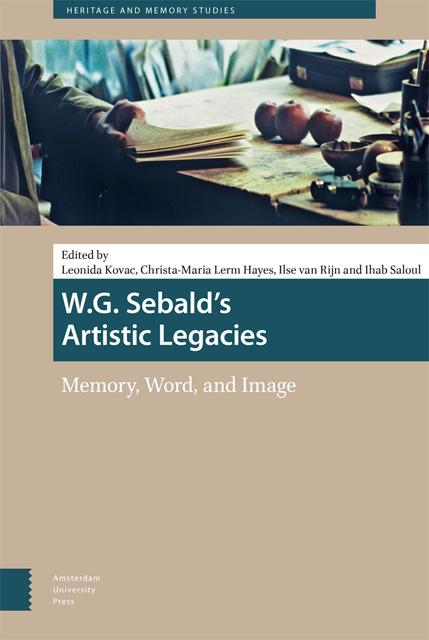6 - In the Labyrinth: Sebald’s (Postwar) French Connections
Published online by Cambridge University Press: 26 October 2023
Summary
Abstract
The generation that came to adulthood during or immediately after the Second World War faced the challenge of making art in the post- Auschwitz world, of confronting a world in which not only people but ideas, conventions, and beliefs were displaced. In France this resulted in the phenomena of the nouveau roman, and the nouvelle vague in film, both of which rejected conventional narrative linearity and challenged ideas of authorship, as well as in music that embraced dissonance. W.G. Sebald was from the next generation, born at the very end of the war and thus without the direct experiences that had shaped those artists, but confronting as an adolescent and then as a young man the way in which the status quo had reasserted itself, the “denazification” process had stalled and the Cold War had changed priorities and stifled the kind of challenging debate that had briefly seemed possible before. Sebald’s interest in the French innovators in film and literature is evident in his work. Here I consider the influence of Alain Resnais, in particular L’Année dernière à Marienbad (screenplay by Alain Robbe-Grillet, the theorist of the nouveau roman), but concentrate on writer Michel Butor, whose novel L’Emploi du temps (Passing Time) was particularly influential on Sebald. I draw upon Sebald’s poetry, on his “Manchester” works including The Emigrants, and on Austerlitz, to show how Sebald responded to their strategies and how they affected his own response to the postwar world.
Keywords: Liberation, Metaphorical, Trauma and Translation, Postwar Narrative and Resistance
Introduction
Two key figures in the postwar French cultural landscape—new wave cinematographer Alain Resnais and my main focus in this chapter, the “nouveau romancier” Michel Butor—had a significant impact on the work of W.G. Sebald. While Sebald and Butor are very different in style and approach, Sebald’s indirect encounter with Butor’s novel L’Emploi du temps in Manchester at the start of his career is explicitly evidenced in his early poem “Bleston: A Mancunian Cantical,” which quotes directly from Butor’s novel, and in his descriptions of Manchester in After Nature and The Emigrants.
- Type
- Chapter
- Information
- W. G. Sebald's Artistic LegaciesMemory, Word, and Image, pp. 115 - 130Publisher: Amsterdam University PressPrint publication year: 2023



